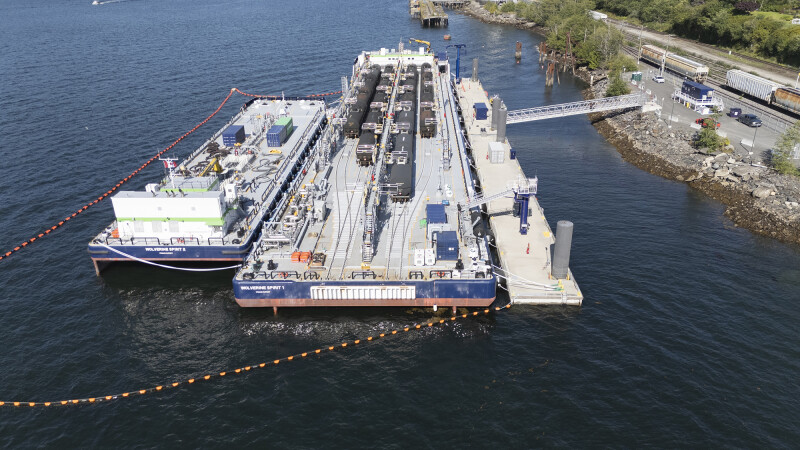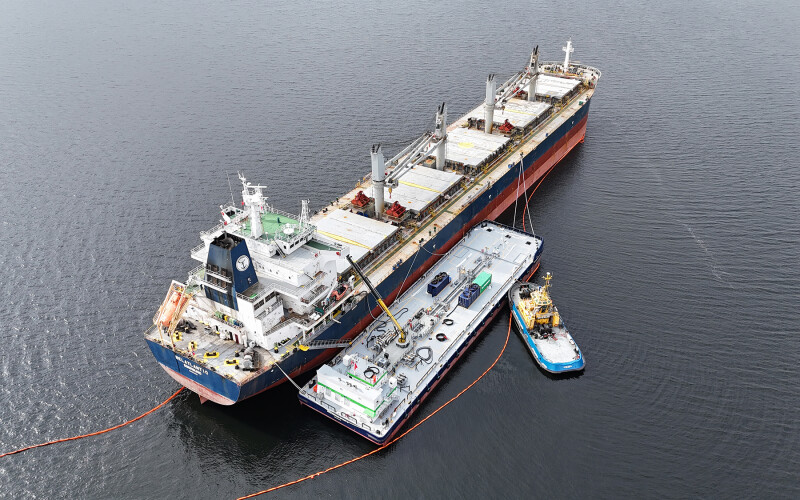Wolverine Terminals has commenced commercial operations at its newly constructed marine bunkering facility in Western Canada.
Located in Prince Rupert, British Columbia, the facility offers transloading, marine fuel storage, and distribution services for fuel products such as marine grade diesel and very low sulfur fuel oil (VLSFO). The facility has access to a supply of domestically produced fuels delivered by rail.
Using a pair of barges designed by Robert Allan Ltd., Wolverine Terminals can deliver a wide range of fuels, including marine diesel, heavy, intermediate, and other blends. The two barges, including a transloading barge and a fuel delivery barge, were built by the Damen Song Cam shipyard in Vietnam and delivered to Wolverine in the second quarter of 2024.
Wolverine Spirit 1, the 466’ long transloading barge, has been custom-designed to accept up to 24 rail tank-cars on deck. These are loaded using a marine rail ramp in Prince Rupert using four rail lanes with a pair of onboard turnouts (switches)—a novel arrangement on a rail barge, according to the designer. Combined with a high-performance ballasting system and Wolverine’s dedicated locomotive, this barge can onboard a full set of railcars during a single tide. Once loaded and secured, the transloading barge is moved using tugs from the loading ramp to the Wolverine Terminals project site, where once moored, the railcars can be drained into the barge’s hull tanks, which have a combined capacity of nearly 80,000 barrels of oil products.
Wolverine Spirit 2, the 256’ long lightering barge, receives fuels from the transloading barge, and is towed to deliver fuel to client vessels in harbor. With a capacity of approximately 30,000 barrels of products, the barge can deliver fuels to oceangoing vessels at up to 450 m3/hr.

Both barges feature double-hulls, extensive containment and response systems, and firefighting systems and equipment. Access to the railcar tops is via a fixed gantry system with Safe Harbor access platforms/gangways, while access between the barges is via a swinging Verhoef gangway with articulated stairs that adjust to ensure safe passage for all combinations of drafts and freeboards between the two barges. Cranes on both barges facilitate the transfer of equipment from shore and handling of hoses.
The barges fully compliant with Transport Canada regulations and are classed for their service with Lloyd's Register. Robert Allan Ltd. said attention has been paid to keep all potential sources of emissions low, with IMO Tier III compliant exhausts equipped with after-treatment, silencing for all diesel-fired machinery, vapor recovery for the cargo systems, and low-intensity lighting.
Kelly Owen, president of Wolverine Terminals, said, “Our goal has always been to offer best-in-class logistics services while minimizing environmental impact and contributing to the economic growth of the port and the region. The start of our commercial operations is the culmination of years of planning, development, and partnership, and we look forward to growing alongside our customers and the Port of Prince Rupert.”





